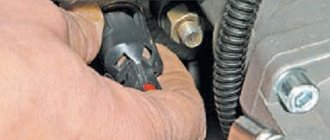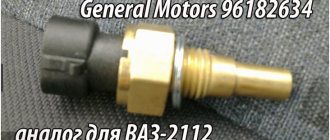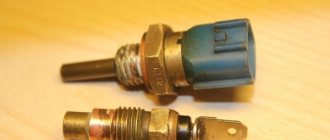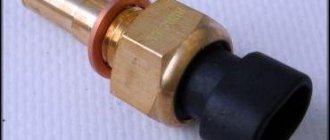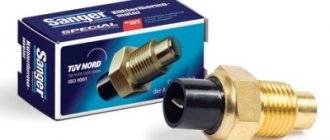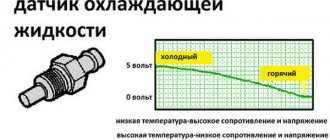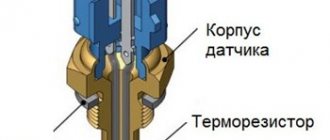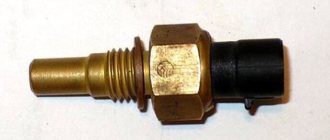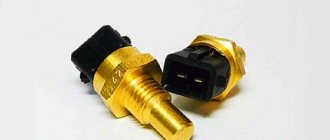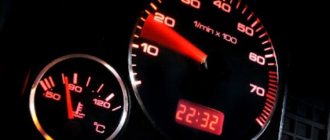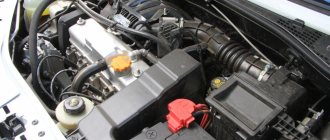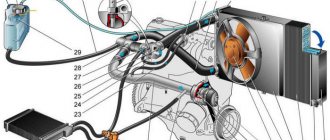In 2001, AvtoVAZ presented the population of the Russian Federation with a modernized version of the “nine” under the symbol 2114. The car slightly changed its appearance and received an injection engine with an electronic control unit (ECU). This is the main controller that collects parameters from all sensors and adjusts the balanced operation of the engine (ICE). Quite often, VAZ 2114 car owners are concerned about the coolant temperature sensor. It is also connected to the ECU, and in a faulty state it causes unbalanced operation of the internal combustion engine. Next, we will tell you where the water t°C sensor is located, on what principle it works, how much it costs, how to check and change it.
For reference! The VAZ 2114 has two coolant temperature sensors. One single-contact - for the t°C indicator on the dashboard. The second (DTOZH) is a two-contact one that takes up space in the electronic system. It is about DTOZH that will be discussed in this article.
Design and principle of operation
The VAZ 2114 engine coolant temperature sensor is a resistor-type device, the mechanism of action of which is based on changing resistance parameters depending on the ambient temperature. DTOZh works on the principle of a negative coefficient: the lower the temperature, the higher the resistance, and vice versa.
Table 1. Operating temperatures and parameters of DTOZH VAZ 2114
| Temperature, t°C | Resistance, Ohm |
| 100 | 177 |
| 40 | 1459 |
| 25 | 2796 |
| 0 | 9420 |
| −20 | 28680 |
| −40 | 100700 |
The indicated values are useful for independently checking the sensor with a multimeter (tester). But more on that below.
Breakdowns
The most popular and common breakdowns of DTOZH include:
- Lack of contact with the sensor;
- Break of contact, insulation disappears;
- The device stops working;
- The fan does not turn on when required.
It is also important to examine the signs of trouble. These include:
- The engine has not yet warmed up, but the fan is already starting to work;
- The engine has warmed up, but still does not work properly;
- Fuel consumption has increased significantly.
DTOZH functions in the ECU system
The injector was replaced by a carburetor, which means the “choke” disappeared from the car. The ECU is now responsible for enriching or depleting the fuel-air mixture. It reads the t°C readings from the temperature sensor and adjusts the supply of gasoline to warm up the internal combustion engine and then operate the car. The DTOZH is also responsible for turning the radiator fan on and off, preventing the coolant from boiling.
Factors and signals of malfunction
Service center specialists quite often encounter breakdowns of DTOZH. Many of them agree that most devices fail for natural reasons. For example, the internal contacts of the resistor break. Because of this, the ECU receives incorrect parameters, which leads to a system failure.
For example, the main controller considers a hot engine to be cold, so it sends a command to the flow meter (DMVR) to enrich the mixture, that is, reduce the air supply. As a result, the motor begins to “choke” and run rough. In addition to the natural breakdown of the DTOZh, other causes of malfunction may appear:
- The seal of the sensor housing is broken.
- There was a break in the electrical wires.
- The power supply has fallen off.
In these cases, the ECU will warn the owner by turning on the Check Engine signal on the dashboard (check engine). In addition, the driver may experience the following signs of sensor malfunction:
- difficult engine starting;
- floating speed;
- severe detonation;
- loss of power;
- the engine stalls.
The listed symptoms are accompanied by a fantastic increase in fuel consumption and the appearance of dark smoke from the exhaust pipe. So it's time to go to a car service for diagnostics. You can also check the ECU system yourself. To do this, install a special application on your smartphone and buy a Bluetooth adapter for the diagnostic block.
conclusions
If necessary, it is easy to replace the sensor yourself, because performing such work in a service center will cost much more than the spare part itself.
The average price in most stores is about 200 rubles, and despite the fact that it is small, they fail with enviable frequency, so the issue of choosing a device should be approached with all seriousness and responsibility.
Sources
- https://zapchasti.expert/datchiki/datchik-temperatury/datchik-temperatury-vaz-2114.html
- https://ladaautos.ru/vaz-2114/osnovnye-priznaki-neispravnosti-dtozh-vaz-2114.html
- https://vaz-2114.info/priznaki-neispravnosti-dtozh-na-vaz-2114/
- https://ladafakt.ru/dtozh-vaz-2114-priznaki-neispravnosti.html
- https://luxvaz.ru/vaz-2114/78-datchik-temperatury-ohlazhdayuschey-zhidkosti.html
- https://remontvazov.com/datchik-temperatury-vaz-2114
- https://carfrance.ru/zamena-datchika-temperatury-oxlazhdayushhej-zhidkosti-vaz-2114-svoimi-rukami-naglyadnoe-posobie/
- https://remontvazov.com/datchik-urovnya-ohlazhdayushhey-zhidkosti-vaz-2114
- https://carfrance.ru/kak-proverit-datchik-temperatury-oxlazhdayushhej-zhidkosti/
Location of DTOZH
For those who have no idea where the coolant temperature sensor is located on a VAZ 2114, finding it will not be difficult at all. Open the hood. In front of you is a transversely mounted engine. On the right side, look down between the cylinder head and the air filter housing. A vertically mounted sensor with 2 wires is looking at you. It is integrated into the coolant flange. The placement location is the same for an engine with 8 valves or one with 16. (A little lower, horizontally, there is another sensor - this is a temperature indicator for the instrument panel. It is connected to 1 white-green wire).
Elimination methods
Once the root causes have been identified, you can move directly to methods to resolve the problem.
To carry out repair and diagnostic operations, you will need some tools, namely: a multimeter, an OBD II cable, a tablet or laptop, as well as a set of keys and screwdrivers for dismantling the main and auxiliary components. So, now that the motorist is fully armed, you can proceed directly to the diagnostic and repair process.
The magnetic motor of the arrow drive is broken
The process of repairing and disassembling the dashboard The most common problem with the arrow hanging or not responding on the instrument panel is a breakdown of the drive motor. To diagnose this device, you need to use a multimeter to close the winding contacts to an electrical circuit or resistance.
If the tester does not show anything, then most likely the winding is burned out or there is a break in contact with the board.
To troubleshoot the problem, of course, it is recommended to contact an auto electrician, who will do everything quickly and efficiently, but if the car enthusiast has the necessary skills and abilities in repairing such equipment, then he will be able to independently replace the motor and solder the necessary contacts.
Breaks and disturbances in the operation of the electrical circuits of the dashboard
Determining a fault related to wiring Another common reason for a stuck sensor is a break in the electrical circuit from the coolant sensor to the dashboard. It is quite simple to identify this; you need to remove the ground wire from the sensor and connect it to any other “minus” so that the electrical circuit is closed.
If the wire is not broken, then the arrow will begin to move; if not, then according to the electrical diagram it is necessary to find the wire in which the break occurred and eliminate the fault. As practice shows, motorists do not change the wire, but simply connect and insulate the contacts at the break point.
Short circuit in the board of the device itself
Determination of short circuits on the tidy board.
There have been numerous cases when a short circuit in the instrument panel board caused the needle to freeze. But, in this case, an indirect sign is that nearby signs also fail. So, the tachometer and other indicators may not show. Here, troubleshooting is to replace the instrument panel assembly.
Freeze due to temperature sensor
Temperature sensor location A frozen temperature arrow on the instrument panel will be associated with a faulty temperature sensor. So, its diagnosis can be carried out by analogy with a wiring break, or checked using a tester. If, as a result of diagnostic operations, it turns out that the coolant sensor is faulty, it must be replaced.
Problems with the computer
The process of identifying ECU errors and eliminating them.
It is extremely rare that the needle freezes due to a malfunction in the electronic engine control unit. In this case, using the appropriate cable, you need to connect to the “brains” of the car and see if there are any errors. If there are too many of them, then you need to reset them.
Of course, if this procedure does not help, then it is recommended to reset the software. It is recommended to trust this procedure to professionals who will not only fix the problem, but also set the motor to optimal operating mode.
Which DTOZH to choose
The spare parts market offers a wide range of products. Here you can find parts of any quality at different prices. Service workshop specialists and independent experts recommend buying the original. In other cases, you can pay attention to worthy, branded analogues. The serial number for the engine temperature sensor on the VAZ 2114–2115 looks like this: 2112–3851010. Sometimes there may be additional numbers 02 or 05. This is the marking of related AvtoVAZ enterprises.
Table 2. Price of the original DTOZH VAZ 2114 and its foreign analogues
| Manufacturer | Number | Amount, rub. |
| LADA | 2112–3851010 | 350 |
| Daewoo | 96 181 508 | 300 |
| Magneti marelli | 1719 16011 150 | 355 |
| General Motors | 21123851010 | 630 |
| Vemo | V40–72–0322 | 1170 |
Sources: maxparts.ru, exist.ru.
You can also buy cheaper analogues, within 150 rubles. But you shouldn’t count on long-term operation of such parts. In the coming months or even weeks, you will have to run to the store again for a sensor. And these are additional costs and time for car repairs, that is, the hackneyed “miser pays twice.”
Interesting fact. Some owners of “fours” and other Togliatti models purchase spare parts through foreign car departments. Imported shock absorbers, struts, springs, timing belts and rollers, electrical equipment and other parts last longer.
Bottom line
Many are inclined to criticize the domestic manufacturer for allegedly assembling buckets on wheels rather than cars. It’s worth arguing with this, because our cars are accessible, easy to drive, inexpensive to maintain, and most importantly, with minimal skills and a couple of keys, you can make repairs yourself.
The owner of a VAZ 2110 can restore order under the hood himself in those cases when the driver of some cool foreign car is forced to take his car to a service station and shell out huge amounts of money for servicing.
YouTube responded with an error: The provided API key has an IP address restriction. The originating IP address of the call (87.236.20.136) violates this restriction.
How to check
There is a lot of counterfeit goods on the Russian spare parts market. Often you come across outright dummies. Therefore, before installation, experts recommend checking the coolant temperature sensor, whether on a VAZ 2114 or on any other car. This is quite simple to do; the main thing is to have a multimeter (tester).
Convert the meter to an ohmmeter. At room temperature (+23 °C, +25 °C), the readings should be within 2780 Ohms (as in table No. 1). If you place the DTOZH in a glass of boiling water (+100 °C), hold it for a while and take readings, a result of 175–180 Ohms should appear on the tester screen. If so, then the purchase is in good condition. Now you can safely install it on your car.
Sensor design
The sensor is a thermoelement placed in a bronze shell. It has direct contact with antifreeze, and the thermoelement, which is enclosed in the sensor, changes its resistance as the temperature rises or falls and transmits the received readings to the computer.
The sensor has a threaded connection sealed with a special copper ring; on the top of the sensor there is a connector for connecting a plug.
Replacement
Like any repair, dismantling and subsequent installation of the coolant temperature sensor on a VAZ 2114 begins with preparation. Firstly, it is recommended to find a flat area for the car. You can do it outside or in the garage. Secondly, you need to prepare a tool: open-end and ring wrenches (19 mm, 13 mm, 10 mm, 8 mm).
In order not to drain the antifreeze, experts advise pumping out the coolant from the expansion tank with a large 100–250 ml medical syringe, through a dropper tube or a small 15–20 cm rubber hose. It is advisable to prepare a 0.5–1 liter container for the antifreeze. The step-by-step replacement process looks like this:
- We wait until the engine cools down.
- We pump out the coolant with a syringe (usually 150–250 ml).
- Remove the negative terminal from the battery (10–13 mm wrench, depending on the type of mounting structure);
- Unscrew the bolts of the air filter housing.
- We take the “pan” to the top and place it on the right.
- Disconnect the power supply from the sensor.
- Unscrew the DTOZH.
- Clean the mating surface from dirt.
- We screw in the new DTOZH.
Let's collect everything in reverse chronology. The entire operation takes 5–10 minutes. We start the car. Warming up. We evaluate his work. We inspect the repair site for coolant leakage from under the connection.
Question: Why didn’t you coat the seat with sealant? We answer: independent experts and service station technicians do not recommend using sealant, since the sensor has a copper sealing ring. It is soft and crimps perfectly, providing the necessary sealing.
Troubleshooting steps
To identify a malfunction, experienced technicians do the following:
- They start checking with fuses, replace the burnt ones, and this can solve the problem;
- Inspection for external damage (melted plastic, insulation, chips)
- Remove the terminal by unfastening the latch and clean the contacts. If the problem is in them, then the operation of the motor will stabilize;
- Check the power circuit with a multimeter; lack of power will mean a wire break;
- Removing and checking the DTOZH;
